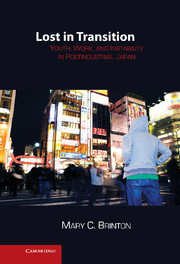Book contents
- Frontmatter
- Contents
- Figures
- Tables
- Preface
- Acknowledgments
- Lost in Transition
- 1 The Lost Generation
- 2 The Historical Roots of Japanese School-Work Institutions
- 3 The Importance of Ba, the Erosion of Ba
- 4 Unraveling School-Employer Relationships
- 5 Networks of Advantage and Disadvantage for New Graduates
- 6 Narratives of the New Mobility
- 7 The Future of the Lost Generation
- References
- Index
Preface
Published online by Cambridge University Press: 05 June 2012
- Frontmatter
- Contents
- Figures
- Tables
- Preface
- Acknowledgments
- Lost in Transition
- 1 The Lost Generation
- 2 The Historical Roots of Japanese School-Work Institutions
- 3 The Importance of Ba, the Erosion of Ba
- 4 Unraveling School-Employer Relationships
- 5 Networks of Advantage and Disadvantage for New Graduates
- 6 Narratives of the New Mobility
- 7 The Future of the Lost Generation
- References
- Index
Summary
Preface
Foreign visitors arriving in Tokyo can be forgiven for not immediately sensing the havoc wreaked on individual lives by the economic recession and dramatic employment restructuring of the late twentieth century. The bursting of Japan’s financial and real estate bubble in the early 1990s led in the ensuing decade to the highest unemployment rates and greatest economic anxieties experienced in the country since the early post–World War II years. And while the country was still struggling to recover, financial crisis hit once more in the fall of 2008 – this time striking down postindustrial economy after postindustrial economy and sending unemployment rates up once more. Even so, a walk down the street in Tokyo’s central business districts reveals sidewalks full of middle-aged sarariimen (male office employees) rushing to their next appointments. A stroll past upscale coffee shops in Tokyo’s major shopping districts provides glimpses into an elegant world populated by clusters of upper- middle-class housewives enjoying lunch and gossip together. These sights, so familiar from Japan’s period of sustained economic growth prior to the 1990s, can make it seem that not so much has changed after all during the subsequent years of recession.
There is a reason these scenes mask the impact of economic recession and employment restructuring: Those most affected are not the middle-aged and not the elite. Instead, the people who have been “lost in transition” as the Japanese economy tries to restabilize itself in the early twenty-first century are people in the younger generation, especially the non-elite among them. This book tells the story of these individuals. I analyze why so many of them became lost in the transition from school to work and, in a larger sense, lost in Japan’s transition to a mature postindustrial economy with a labor market ever more bifurcated between “good” and “bad” jobs.
- Type
- Chapter
- Information
- Lost in TransitionYouth, Work, and Instability in Postindustrial Japan, pp. xi - xviiiPublisher: Cambridge University PressPrint publication year: 2010



